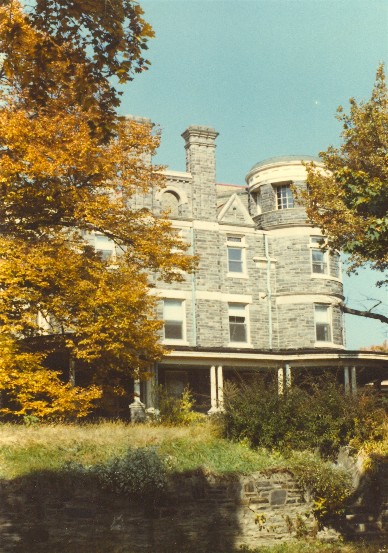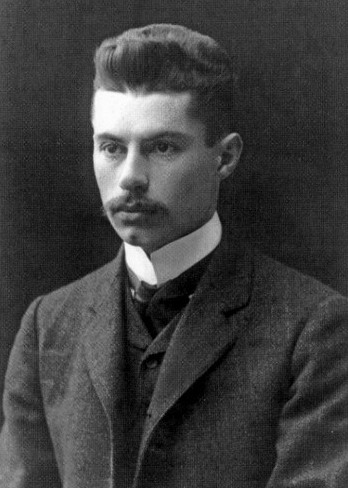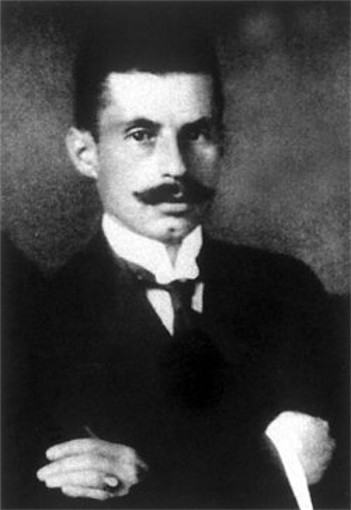Lypynsky, Viacheslav
Lypynsky, Viacheslav [Lypyns’kyj, V'jačeslav] (Lipiński, Wacław), b 5 April 1882 in Zaturtsi, Volodymyr-Volynskyi county, Volhynia, d 14 June 1931 near Vienna. (Photo: Viacheslav Lypynsky.) Historian, political philosopher, and publicist; full member of the Shevchenko Scientific Society from 1914. After studying history and agronomy at Cracow University and Geneva University he settled on his estate in the Uman region and devoted his energies to reconverting the Polonized nobility to Ukrainian culture. He wrote the brochure Szlachta ukraińska i jej udział w życiu narodu ukraińskiego (The Ukrainian Gentry and Its Participation in the Life of the Ukrainian People, 1909) and articles in the biweekly Przegląd Krajowy. He accepted some of the ideas of the khlopomany but wanted the nobility to change into a politically conscious Ukrainian class that would preserve its corporate character. His efforts were at least partly successful.
His first historical works were articles in the serials Literaturno-naukovyi vistnyk, Zapysky Naukovoho tovarystva im. Shevchenka, and Rada (Kyiv), as well as the monumental Z dziejów Ukrainy (From the History of Ukraine, 1912; repr 1959), which was edited and for the most part written by him (particularly the monograph Stanisław Michał Krzyczewski). In 1917 he took part in organizing the Ukrainian Democratic Agrarian party and drafted its program, based on the principle of a sovereign Ukrainian state and the private ownership of land. Under the Hetman government Lypynsky was appointed Ukrainian envoy to Vienna, and he retained that post under the government of the Ukrainian National Republic until June 1919.
Except for a brief stay in Berlin (1926–7), where he held the chair of state history at the Ukrainian Scientific Institute in Berlin, Lypynsky lived in Austria after the period of Ukraine's struggle for independence (1917–20). That was his most creative period; his monograph Ukraïna na perelomi 1657–1659 (Ukraine at the Turning Point of 1657–1659, 1920, 1991) was published, and at his initiative the Ukrainian Union of Agrarians-Statists (USKhD) was formed. He drafted its statute and served as president of its board of directors. He became a leader and ideologist of the conservative monarchist movement, which won adherents among Ukrainians abroad and in Western Ukraine. Its ideological journals were the irregular collection Khliborobs’ka Ukraïna (1920–5), which published his fundamental political treatise Lysty do brativ-khliborobiv (Letters to Brothers-Agrarians) in 1926 (repr 1956). Tactical and ideological disagreements with Hetman Pavlo Skoropadsky led Lypynsky to dissolve the USKhD in 1930, and with a small group of followers (M. Kochubei, Volodymyr R. Zalozetsky-Sas, and Vasyl Kuchabsky) he set up the short-lived Brotherhood of Ukrainian Classocrats-Monarchists. Its organ was Zbirnyk khliborobs’koï Ukraïny.
Lypynsky's historical research centered on the Cossack revolution of the mid-17th century (see Cossack-Polish War). He offered the view, in contrast to the populist interpretations of the Bohdan Khmelnytsky period, that that period represented a fundamental stage in the development of Ukrainian statehood. According to Lypynsky the rebirth of the Ukrainian state was conditioned by the following factors: (1) the consolidation of all social strata around the Cossack nucleus, which in the course of the liberation war absorbed the most active elements of all the other estates; (2) the strong influx of the Ukrainian nobility into the Cossack ranks, which at a decisive moment raised the political culture of the Cossacks and enabled the settled, town Cossacks to control the seminomadic Zaporozhian Cossacks; (3) the victory of the nobility-Cossack starshyna land tenure system, with its intensive khutir farming, over the extensive colonial and parasitic farming practiced by Polish magnates on their latifundia; and (4) the Orthodox church's blessing for the liberation war. Lypynsky paid particular attention to the way in which the essentially military organizations were transformed into a territorial government of a monarchial (hereditary) inclination. He regarded the Pereiaslav Treaty of 1654 as a military alliance of Ukraine and Muscovy. Along with Stepan Tomashivsky and Dmytro Doroshenko Lypynsky founded a new statist school of Ukrainian historiography.
His Ukrainian political program was based on a universal theory that was influenced by a number of contemporary Western (particularly French) thinkers, such as Georges Sorel, Vilfredo Pareto, and Gustave Le Bon. According to Lypynsky states arose by conquest, either external or internal. Regardless of their structure all states had a certain quantity of power and an elite which exercised it. For Lypynsky the three sources of power were military (warriors), economic (producers), and intellectual (intelligentsia), of which various combinations were possible. He attributed special politically creative abilities to the warriors and producers and gave the intelligentsia the auxiliary role of articulating the elemental, unconscious strivings of society. His three main kinds of state were classocracy, democracy, and ochlocracy; they were timeless, and appeared in various periods, at various stages of economic development, and in various cultures. Characteristic of a classocracy was the balance between power and liberty, and between conservative and progressive forces; democracy promoted personal freedom; and ochlocracy, the absolutist rule of warriors-nonproducers, suppressed liberty and civic initiative. The three state types succeeded each other with a certain regularity: the classocracy, spoiled by excessive prosperity, degenerated into democracy, which was then destroyed by ochlocracy, and the struggle against ochlocracy gave rise to classocracy. That historical cycle was not, however, deemed deterministic.
Lypynsky rejected the subordination of the church to the state (cesaropapism) and the striving of the clergy for political power (clericalism). Instead he advocated co-operation between the church and the state as two autonomous and equal institutions. The religious theme was omnipresent in his works; he professed that the ultimate purpose of human activity is to realize, as far as possible, the eternal truth in the life of nations. Lypynsky expressed his views on the historical role of the Ukrainian church in Relihiia i tserkva v istoriï Ukraïny (Religion and Church in the History of Ukraine, 1925, 1933, 1956).
On those foundations he built his Ukrainian political program. He believed that the Ukrainian nation could best be unified on the basis of territorial patriotism, that is, solidarity among all the permanent inhabitants of Ukrainian territories regardless of their social standing, religious faith, ethnic origin, and even national consciousness. The Ukrainian liberation movement had to depend not only on the intelligentsia, but also on the managers of agriculture, industry, and the military. Ukraine would be a common homeland for all; hence, the reassimilation of the denationalized higher social strata was a necessary condition for the revival of Ukrainian statehood. It was more important to have Ukrainian organic class (professional) structures than Ukrainian political parties. Lypynsky was a severe critic of the democratic wing (the UNR camp) and the ochlocratic wing (the Soviet and nationalist movements) in Ukrainian politics. In his opinion only the classocratic system, based on a hereditary and legal ‘labor monarchy’ in the traditional form of the hetmanate, could meet the needs of Ukrainian state-building.
A fair portion of Lypynsky’s correspondence has been published by the Lypynsky East European Research Institute, including letters to him from Dmytro Doroshenko (1973) and Osyp Nazaruk (1976); and letters from him to Doroshenko and other figures (1996) and to Nazaruk (2004). The first installment of a multi-volume, alphabetically-arranged series of publications dealing with Lypynsky’s correspondence, edited by Roman Zalutsky and Christina Pelenski, appeared in 2003.
BIBLIOGRAPHY
Zabarevs’kyi, M. [Doroshenko, D.]. V'iacheslav Lypyns’kyi i ioho dumky pro ukraïns’ku natsiiu ta derzhavu (Vienna 1925; Augsburg 1946)
V. Lypyns’kyi iak polityk i ideoloh (Uzhhorod 1931)
Dzvony [commemorative issue], 1932, no. 6
Bosyi, V. V'iacheslav Lypyns’kyi: Ideoloh ukraïns’koï trudovoï monarkhiï (Toronto 1951)
Pyziur, Ie. ‘Viacheslav Lypyns’kyi i politychna dumka zakhidn’oho svitu,’ Suchasnist’, 1969, no. 9
Pelenski, J. (ed). The Political and Social Ideas of Vjačeslav Lypyns’kyj, special issue of HUS, 9, no. 3/4 (1985)
Rudnytsky, I. ‘Viacheslav Lypynsky: Statesman, Historian, and Political Thinker,’ in his Essays in Modern Ukrainian History, ed P. Rudnytsky (Edmonton 1987)
Pelens’kyi, Ia. (ed). V'iacheslav Lypyns’kyi: Istoryko-politolohichna spadshchyna i suchasna Ukraïna (Kyiv–Philadelphia 1994)
Horielov, M. Peredvisnyky nezalezhnoï Ukraïny: Istorychni rozvidky (Kyiv 1996)
Ostashko, T.; Tereshchenko, Iu. (eds). V'iacheslav Lypyns’kyi z epistoliarnoï spadshchyny (Kyiv 1996)
Masnenko, Vitalii. Istorychni kontseptsiï M.S. Hrushevs’koho ta V.K. Lypyns’koho: Metodolohichnyi i suspil’no-politychnyi vymiry ukraïns’koï politychnoï dumky 1920-kh rokiv (Kyiv–Cherkasy 2000)
Halushko, Kyrylo. Konservator na tli doby: V’iacheslav Lypyns’kyi i suspil’na dumka ievropeis’kykh pravykh (Kyiv 2002)
Gancarz, Bogdan. My, szlachta ukraińska: Zarys życia i działalności Wacława Lipińskiego 1882–1914 (Cracow 2006)
Ivan Lysiak Rudnytsky
[This article was updated in 2009.]



